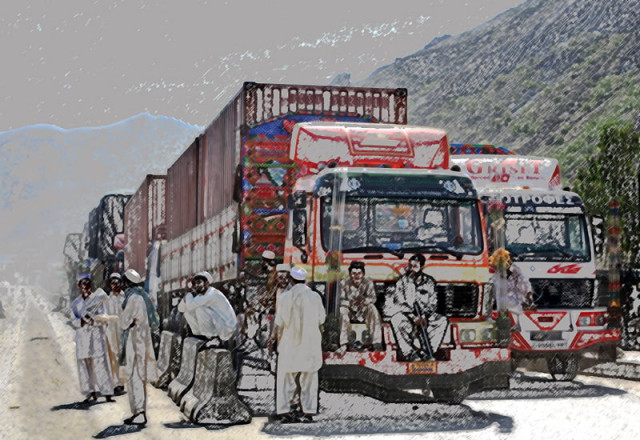Truckers gear up for another stalled week
The goods carriers have gone off the road demanding protection from ‘hooligans’.

The strike call by goods’ carriers entered into its ninth day on Monday as truck owners refused to call it off until the government addresses their concerns.
“We will carry on with the strike until government stops the NHA [National Highway Authority] and highway police from harassing our drivers,” said Rana Aslam, an office bearer of All Pakistan Goods Carrier Association. “It doesn’t matter to us how long we wait now.”
For a second week running, the trucking industry may remain stalled. Since Tuesday, over 40,000 trucks, 120,000 truckers and many more labourers associated with the cargo trade have been out of business.
The transporters’ strike across the country has halted almost all movement of goods especially at the three seaports. The protest was called by the United Goods Transporters Alliance (UGTA) - a newly assembled coalition of over 37 different truckers’ unions. The protesters demand increased protection of vehicles on roads, resolving issues of overloading with the National Highways and Motorway Police (NHMP) and extortionists. Truckers from Khyber-Pakhtunkhwa, Punjab and Balochistan have also joined the protest, halting all road cargo activities across the country, claimed UGTA general secretary Muhammad Shoaib Khan.
The truckers claim they are not secure on the roads. “Bandits kidnap our drivers and take away everything from the containers. Sometimes they fire at the drivers when they try to speed away,” said Khan. The Northern Bypass and all areas in rural Sindh are notorious, while vehicles are often looted at Lodhran, Khanewal and Dunyapur in the Punjab.
NHMP’s Adnanul Haq said the truckers are fined for overloading and improper loading. “We are trying our best to help the transporters. We have recovered many trucks and containers from criminals and on many occasions, we have also saved them during robberies,” he added.
Meanwhile, Aslam believed that, “the business of carrying goods has been going on like this for years and we can’t adopt international standards overnight”. NHA wants an average-sized truck to carry not more than 22 tons, far less than the 35- to 40-ton limit observed by the goods carriers, he said.
Referring to their ongoing strike, Shoaib said the Sindh government contacted them but there has been no response from the federal government. “A day’s strike causes losses amounting to millions of rupees but we were compelled to take this step,” argued the UGTA general secretary.
The strike has also taken its toll on the stevedores at the ports. “This week has been terrible as my family totally depends on what I earn daily,” said 45-year-old Fazal Raziq at the Karachi port. On average, Raziq makes between Rs 5,000 and Rs7,000 in a week.
The strike has adversely affected the imports and exports of every industry - from fruit and vegetables to textiles. Everyday two to three vessels leave Karachi each carrying 400 to 500 containers of exports goods.
According to the central chairman of Pakistan Hosiery Manufacturers and Exporters Association, Mohammad Jawed Bilwani, it is impractical to export the goods by air. By sea, the freight charges to the US of a 40-foot container are $3,500. But if it is sent by air, its freight jumps to around $30,000.
With additional input by Saad Hasan
Published in The Express Tribune, December 11th, 2012.



















COMMENTS
Comments are moderated and generally will be posted if they are on-topic and not abusive.
For more information, please see our Comments FAQ